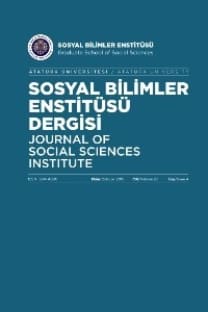Avrupa Birliğine Üyelik Sürecinde Türkiye’nin Seçilmiş Endeks Göstergeleri
Türkiye, Avrupa Birliği, Ekonomik göstergeler
Turkey, European Union, Economic Indicators,
___
Alkire, S., Santos, M. E. (2010). Acute Multidimensional Poverty: A New Index for Developing Countries. United Nations Development Programme Human Development Reports Research Paper.Şeker, S. D. (2011). Türkiye’nin İnsani Gelişme Endeksi ve Endeks Sıralamasının Analizi (Elektronik sunum). T.C. Kalkınma Bakanlığı Yayın No: 2828 Ünal, Ç. (2009). İnsani Gelişmişlik Endeksine Göre Türkiye’nin Bölgesel Farklılıkları. Ankara Üniversitesi Türkiye Coğrafyası Araştırma ve Uygulama Merkezi. Coğrafi bilimler Dergisi Cilt:6 Sayı:2, s.89-113.
Tekin, A. (2004). “Future of Turkey - EU Relations: A Civilisational Discourse”. Futures, 37(4), ss. 287-302.
İstanbul Sanayi Odası (2010). Türkiye Ekonomisi (Elektronik sunum). İstanbul: İstanbul Sanayi Odası Yayınları No: 2010/8
UNDP (2000). Human Development Report. Published for the United Nations Development Programme. Oxford University Pres.
UNDP (2006). Human Development Report. Published for the United Nations Development Programme. Oxford University Pres.
UNDP (2007). Human Development Report. Publıshed for the United Nations Development Programme. Oxford University Pres.
UNDP (2011). Human Development Report. Publıshed fort he United Nations Development Programme. Oxford University Pres. http://www.abgs.gov.tr/index.php?p=111 (Erişim 14.02.2013) http://www.abgs.gov.tr/index.php?p=3 (Erişim 14.02.2013) http://www.abgs.gov.tr/files/EMPB/aday_potansiyel_aday_ulkeler_ekonomik_gelismeler_2ceyrek.pdf (Erişim 14.02.2013)
- ISSN: 1304-4990
- Yayın Aralığı: 4
- Yayıncı: Atatürk Üniversitesi Sosyal Bilimler Enstitüsü Müdürlüğü
Bir Eleştirel Söylem Biçembilim Uygulaması: Adalet Ağaoğlu’nun “Karanfilsiz” Adlı Hikâyesi
Türkiye’deki Organik Tarımın Ekonomik Analizi
Marshall Tipi Dışsal Ekonomiler, Endüstriyel Bölgeler ve Çağdaş Yaklaşımlar
Esra Sena TÜRKO, Ş. Mustafa ERSUNGUR
Yeni Ekonomik Coğrafya ve Teorik Modelleri
Emine Demet EKİNCİ, Ş. Mustafa ERSUNGUR
Salvador Dali’nin Takı Çalışmaları / Jewelry Works of Salvador Dali
Avrupa Birliğine Üyelik Sürecinde Türkiye’nin Seçilmiş Endeks Göstergeleri
İran’da Gelir Dağılımı Üzerine Doğrudan Yabancı Yatırımın Etkisi
Ebül Muhsin DOĞAN, Ali SHAHİNPOUR, Khadijeh AGHAPOUR
